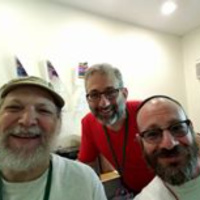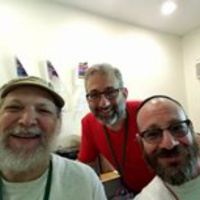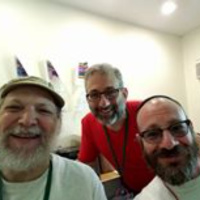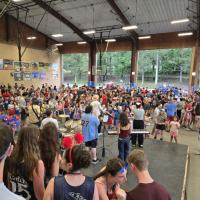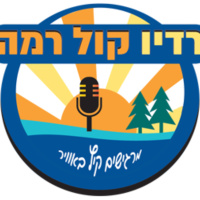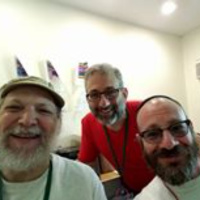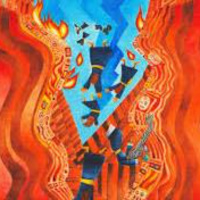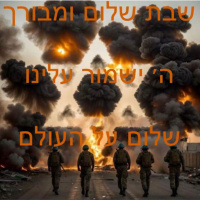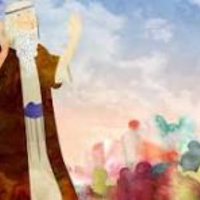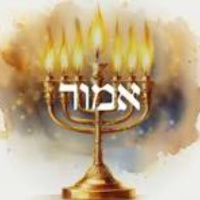Synopsis
Broadcasting from Camp Ramah in the Berkshires. We are the soundtrack for each summer! Our air is filled with shows produced by and for the campers!LISTEN LIVE: http://KolRamah.us
Episodes
-
Parsha Talk Devarim 5785 2025
01/08/2025 Duration: 35minParashat D’varim [Deuteronomy 1:1-3:22] is the opening parashah of the Book of Deuteronomy. Having reached the eastern border of the Promised Land, Moses addresses the people for the last time in a series of discourses, culminating in his death alone atop the mountain, to be buried by God in a place unknown to any human. We spent over half our conversation discussing Moses as prophet and leader at this particular time in his life, and what he had to say to his people as his life comes to its conclusion while the people ready themselves to begin their lives anew in Israel. In the remaining time we discussed the haftarah [Isaiah 1:1-27]. This Shabbat, the one preceding [and this year immediately preceding] Tisha B’av, observed Saturday night and Sunday, August 2-3, 2025, is called Shabbat Chazon, the Shabbat of Vision, after the first word in the Book of Isaiah. It is the third of the three haftarot of admonition, which will be followed by the 7 haftarot of consolation. We continue to keep in our hearts and
-
A17 Nitzanim Sivuv 072425
30/07/2025 Duration: 41minBunk A17 Nitzanim stops by the Kol Ramah studio to visit Rotem and tell us all about life at camp!
-
A14 Tzeirim Sivuv 072425
30/07/2025 Duration: 51minBunk A14 Tzeirim stops by the Kol Ramah studio to visit Rotem and tell us all about life at camp!
-
A10 tzeirim sivuv 071725 post
30/07/2025 Duration: 40minBunk A10 Tzeirim stops by the Kol Ramah studio to visit Rotem and tell us all about life at camp!
-
Sivuv Camp Together - With Rotem Shimony
30/07/2025 Duration: 42minToday we hosted the Camp Together program! Teens from Isreal are joining Camp Ramah and are here to tell us about themselves and their experiences.
-
Parsha Talk Matot Masei 5785-2025
24/07/2025 Duration: 37minParashat Mattot-Massei [Numbers 30:2-36:13] is a double parashah which concludes the Book of Numbers. It is one of the longest readings of the year, even for those who use the triennial cycle. Our focus this week was the curious story about the tribes of Gad and Reuven, and the half-tribe of Menashe. As the Israelites’ forty-year journey is coming to an end, with the entrance into the Land of Israel imminent, these tribes, blessed with much cattle and flocks, decide they want to stay east of the Jordan. How to unpack this story? Give a listen! We continue to be mindful of the hostages being held in Gaza, both the living and the dead, may they be speedily returned to their families. We also keep in mind those defending Israel as part of the Israel Defense Forces, may they be removed from harm’s way. Shabbat Shalom and Chodesh Tov [the month of Av, which marks the 11th yahrtzeit of my father, Mel Chesler z”l, is this Shabbat].
-
Nitzanim podcast - Review of Camp Shows
20/07/2025 Duration: 22minJoin us for the nitzanim show! We invited our hofa'a staff for a visit, and they told us all about their work on the musicals at camp. Featuring: Arielle , Raviv , Naama Yael, Hazel and Annabel . And our staff: Rotem Shimony with Stacy Greenblatt, Jojo Adams and Mika Sayag.
-
Parsha Talk Pinchas 5785 2025
18/07/2025 Duration: 35minParsha Talk Pinchas - a Kayitz favorite! Parashat Pinchas [Numbers 25:10-30:1] is probably best known for the holiday calendar in chapters 28 and 29, from which the maftir is taken for the Yamim Noraim [the Days of Awe, Rosh Hashanah and Yom Kippur], for the Shalosh Regalim [the three pilgrimage festivals, Pesach, Shavuot, and Sukkot], and Rosh Chodesh [the beginning of the Hebrew month]. In addition we have the conclusion to the story of the apostasy at Baal Peor, the Second Census in chapter 26, the first rendition of the daughters of Zelophehad, who successfully appeal to Moses to inherit from their father because he had no sons, and the succession of Moses by Joshua. There is a lot to talk about! We continue to keep in mind the hostages, dead and alive, who remain in Gaza, may the be returned to their families speedily. We also are mindful of the soldiers defending Israel as members of the Israel Defense Forces, may they be removed from harm’s way. Shabbat Shalom.
-
A10 Tzeirim visit Kol Ramah - Sivuv 071725
18/07/2025 Duration: 39minListen to our guests from bunk a10! A live recording from 7/17 with tzeirim campers telling us about themselves and choosing some fun music:) Featuring Adin, Micah, Jona, Noam, Wesley, Seymour, Louis, Liaml, Asher, Charlie, Nolan, Ben.
-
Parsha Talk Balak 5785 2025
11/07/2025 Duration: 34minParashat Balak [Numbers 22:2-25:9] primarily tells the tale of Balaam the seer, who is commissioned to curse the Israelites, of whom Balak is deathly afraid. Balak’s plan does not go as planned, as God has other plans for Balaam, one of which involves the famous talking donkey, a precursor to the perhaps more famous Mr. Ed. According to the rabbis, the mouth of the donkey was created on the eve of the first Shabbat, late in the 6th day of Creation, suggesting that already imbedded in Creation was this talking donkey in order to remove the donkey from the realm of the supernatural. Most of the parashah is taken up with Balaam’s four oracles about Israel, concluding with three oracles against the nations. Of particular interest to synagogue goers is Numbers 24:5, which has been incorprorated into the liturgy as the Mah Tovu, the first verse of a paragraph recited upon entering the synagogue for prayer. It is quite striking that this line is uttered for the first time by a non-Jew. The Parashah concludes wi
-
4th of July Concert 2025
09/07/2025 Duration: 01h02minSoundtrack of this year's fantastic Fourth of July extravaganza! Featuring Landon Braverman and the Tzevet Hofa'a Band!! Special thanks to Mike Schatzberg and Rotem Shimony for recording. Edited and mastered by Yaniv Morozovsky.
-
Tyul Shorashim full show
09/07/2025 Duration: 14minShorashim bechira project - Tiyul Shorashim Join us for a trip around camp with Edat Ha'Shorashim and hear what the campers have to tell!
-
Parsha Talk Hukkat 2025 5785
03/07/2025 Duration: 32minParashat Chukat [Numbers 19:1-22:1] is perhaps best known for the story about Moses & The Rock, for which Moses and Aaron were denied entrance into the Land of Israel. Aaron will die later in the parashah, and Moses’s death is recorded in the last chapter of the Torah [Deuteronomy 34], read on Simchat Torah morning. The other well-known chapter is Numbers 19, which is the maftir reading for Shabbat Parah, the third of the four special shabbatot leading up to the holiday of Pesach. This chapter describes the ritual of the red heifer, whose ashes are used to prepare the potion used for purification from corpse contamination. Water also features in the parashah, as it did in our conversation as well. We remain mindful of the hostages, dead and alive, who continue to remain in Gaza; may they be speedily returned to their families. We keep in mind the soldiers defending Israel as members of the Israel Defense Forces, may they be removed from harm’s way. Shabbat Shalom.
-
Parsha Talk Korach 5785 2025
26/06/2025 Duration: 34minParashat Korach [Numbers 16-18] primarily relates the story of Korach’s rebellion. Modern biblical criticism suggests that the text is perhaps an amalgam of as many as four different rebellions. Our conversation focused on the rebels and on what they were actually rebelling against. How should we characterize Korach, and Dathan and Aviram? Did they have legitimate complaints? Or are they best described as demagogues? How doe we evaluate Moshe as a leader? Give a listen and let us know what you think! We continue to be mindful of the hostages, dead and alive, who are still held in Gaza, may they be speedily returned to their families, and the soldiers defending Israel as part of the Israel Defense Forces. In addition, even with the announced truce between Israel and Iran, we are mindful, too, of the Israeli civilians, under attack, may they be spared. Shabbat Shalom.
-
Parsha talk Shelach Lekha 5785 2025
19/06/2025 Duration: 36minParashat Sh’lach [Numbers 13-15] is predominantly devoted to the episode of the spies, the 12 tribal leaders, men of renown, who entered the Land of Israel to scout it out and come back with a report to B’nai Yisrael, the Israelite community. The devastating consequence of that report was God’s decree that no one over twenty, save the two who rejected that bad report, Caleb and Joshua, would be permitted to enter the Land. Our conversation explored the nature and implications of the spies’ experience in the land. We spent some time, too, discussing the it in relation to the episode of the Golden Calf, an event with which it is sometimes linked, both in the Bible and rabbinic literature. Since our last recording, the war with Iran broke out. We continue to keep in mind the hostages, dead and alive, who, well over 600 days later, remain in Gaza, and pray that they be returned to their families speedily. We also keep in mind the soldiers defending Israel as members of the Israel Defense Forces, may they be
-
Parsha talk Beha'alotkha 2025 5785
13/06/2025 Duration: 35minParashat B-ha’alot’kha [Numbers 8:1-12:16] has a number of different topics, including the story where Miriam and Aaron apparently malign Moses and Miriam is punished with tza’ra’at [commonly translated as leprosy] and Pesach Sheni, the provision for the observance of Passover a month later for those who were too far from Jerusalem or were ritually impure when the holiday was supposed to be observed in Nisan. Our focus was mostly on the little story between Hovav [Moses’ father-in-law apparently] and Moses [Numbers 10:29-34], which has a parallel in Exodus 18. We continue to have in our hearts and minds the hostages, dead and alive, who continue to be held in Gaza, may they speedily be returned to their families, and the soldiers defending Israel in the Israel Defense Forces, may they be removed from harm’s way. Shabbat Shalom.
-
Parsha Talk Naso 5785 2025
06/06/2025 Duration: 37minParashat Naso [Numbers 4:21-7:89] contains, among other things, the longest chapter in the Torah, Numbers 7 which describes in detail the gifts of each of the tribal chieftains to the Tabernacle. Each chieftain gives the exact same gift, which is faithfully recorded, accounting for the length of the chapter. There are other things of note, including the rite of the suspected adulteress [sotah], and the Nazir, the one who takes upon himself additional restrictions for a prescribed period of time. Our entire conversation focused on the six verses [Numbers 6:22-27] which include the priestly blessing. We hope you enjoy it! Over 600 days after October 7, 2023, we continue to keep in mind the hostages remaining in Gaza, both the living and the dead, and pray that they be returned speedily to their families. We also keep in mind those soldiers defending Israel as part of the Israel Defense Forces, may they be removed from harm’s way. Shabbat Shalom.
-
Parsha Talk Bemidbar 5785 2025
30/05/2025 Duration: 41minParashat B’midbar [Numbers 1:1-4:20] is the first parashah of the Book of Numbers. As befitting a book called Numbers, the parashah is filled with numbers, in particular, the number of men of fighting age in each tribe. An additional feature of the parashah is the tribal names of each of the tribes, which can provide interesting information for those who enjoy studying such things. Censuses, for many, are mind-numbing. We spent the first half of our conversation talking about the social structure revealed by the organization of the Israelite camp. The second half of our conversation was devoted to Shavuot, which begins Sunday evening, June 1. We hope you find something worthwhile for your deeper understanding of the parashah, and for the holiday which the rabbis identify as the Time of the Giving of the Torah. As the hostage crisis passes 600 days, we continue to be mindful of those still in Gaza, both the living and the dead, and continue to pray fervently that they be speedily returned to their famili
-
Parsha talk Behar Behukotai 5785 2025
23/05/2025 Duration: 38minParashat B’har-B’hukotai [Leviticus 25-27], a double parashah, the third in four weeks for those keeping score, is the concluding reading from ספר ויקרא [the Book of Leviticus]. Leviticus is the shortest book in the Torah, only 27 chapters, and with all the double parashiyot this year, is finished in only seven weeks. In his JPS Torah Commentary, Baruch Levine divides the reading into 3 sections: Principles of Land Tenure [25:1-26:2], Epilogue to the Holiness Code [26:3-46], more commonly known as the Tokhekhah [The Rebuke, with a parallel version in Deuteronomy 28], and Funding the Sanctuary [chapter 27]. Our discussion mostly focused on chapter 25, in particular the laws of sh’mittah [sabbatical year] and yovel [jubilee year]. On one hand it is hard to figure out how they worked in practice; on the other, it is hard to figure out how utopian legislation fits into a legal code. Is law supposed to be practical or aspirational? This week we were shocked by the murders of Sarah Lynn Milgrim and Yaron Lischi
-
Parsha Talk Emor 2025 5785
16/05/2025 Duration: 36minParashat Emor [Leviticus 21:1-24:23] is perhaps best known for chapter 23, which describes the holidays and is the Torah reading on the 2nd day of Passover and the first 2 days of Sukkot. It is surrounded by laws related to the priesthood [including restrictions on contact with the dead and whom priests are permitted to marry] and a collection of laws which features one of the few narratives in Leviticus, the curious case of the blasphemer [24:10-22]. It is a spirited discussion; we hope you enjoy it! We are fortunate to take note of the release of Edan Alexander, and continue to pray and hope for the release of all the remaining captives in Gaza, both the dead and the living. We continue to keep in mind the soldiers defending Israel as part of the Israel Defense Forces, may they be removed from harm’s way. Shabbat Shalom.

